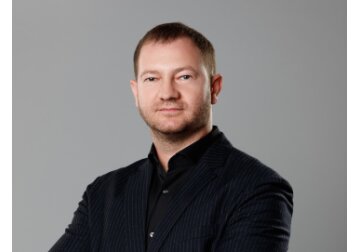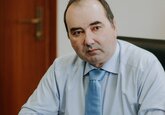
Robert CLAICNET: "Production of up to 75% of grains and 90% of oilseeds in Moldova is ensured by medium and large farms.
Interview by InfoMarket Agency
VERUM Group for 10 years of its activity in agribusiness entered the top 10 Moldovan exporters of grain and oilseeds. According to the data for 1H 2022 it exported over 240 million lei worth of agriculture commodities and took the 7th position among the exporters of Moldova. Robert Claicnet, CEO at VERUM GROUP AGRO TRADING spoke about the Moldovan agricultural market in an interview with InfoMarket Agency.
InfoMarket: What does VERUM Group represent?
Robert CLAICNET: We are one of the leading producers, processors and traders of grains and oilseeds in Moldova. The Group processes more than 150 thousand tons of grains per year, from which we produce feed, flour, ethanol, DDGS, CO2 and other products. Our clients are large traders and industrial consumers from Moldova and abroad. The group is also among the leaders in the production of pork meat, sausages, processed meat and bakery products. Each company of the group acts as a separate business unit, and relations between the enterprises are built exclusively under market conditions.
InfoMarket: Open sources say that you launched your agricultural business in 2012 and now it already cultivates more than 10 thousand hectares of land. How did you manage to consolidate such an area?
Robert CLAICNET: In 2012, we consolidated several agricultural enterprises into one large business unit. Some of them had been operating since 2007, including on land consolidation through purchase or lease. We built stable relationships with landlords, paid land rents on time and gradually the landlords came to us and we managed to consolidate a total of 10 thousand hectares. 20% of them are owned by us and 80% are rented. All the lands are located within a radius of 70 km in the Floresti district, which is very convenient for logistics and cost reduction. For comparison, in Soviet times a kolkhoz that had 4-5 thousand hectares was considered a giant, while we already cultivate 10 thousand hectares.
InfoMarket: In the 1990s Moldova fragmented its farmland and the Pamant (land) program was called Mormant (grave), since as a result of this fragmentation large farms were destroyed and farmers did not know what to do with their plots without money to plant and cultivate them. Can we say that somehow, after all these years, the land has been consolidated again?
Robert CLAICNET: As such, there has been no legal consolidation. I think only 10-15% consolidated through land exchanges or purchase. Consolidation has occurred into large agricultural holdings, but they are not the owners of the land. The market is negotiating physical consolidation, mostly leasehold consolidation. Everyone, no matter how small, is negotiating, as there is no economic sense to work on a small area. Local mayor's offices are also active and involved in resolving disputes. Being interested in tax revenues, they seek to avoid the idling of their residents' land. Today 80% of the land is cultivated by large and medium-sized enterprises, but mostly on leases.
It is interesting that up to 75% of the grains production is harvested by large and medium-sized farms; as far as oilseeds are concerned - 90%, for sugar beet their share reaches 95%. And for vegetables - the share of local farms is in inverse proportion.
InfoMarket: Renting is always a risk that next year the landlord will not want to renew the contract with you, but you had your own plans...
Robert CLAICNET: Risks are sometimes introduced by the ever-emerging small companies that outbid in their first year, but subsequently very rarely pay the landlord and often leave the market. The landlord comes back to us and doesn't want to take any more risks in the future.
InfoMarket: What if one of the landlords whose land is right in the center of your consolidated areas doesn't want to work with you?
Robert CLAICNET: There are examples of that, but we find common ground. Sometimes instead of his one hectare in the center, we offer one and a half hectares on the edge; we will still lose those one and a half hectares as a road, because we are legally obligated to grant him access to his allotment. But in 10 years the landlords prefer to lease the land to us: It is almost not economically profitable to cultivate one and a half hectares alone.
InfoMarket: How do you choose which crops to plant in any given year? Is it market-oriented?
Robert CLAICNET: We focus on crop rotation firstly. And there is no crop that was not in demand in any given year. We try to grow everything: rapeseed, peas, wheat, barley are the first group; sorghum, sunflower, corn are the second.
The emphasis is on high-starch crops, such as corn and especially sorghum, for which we are the leader in Moldova. And if for some reason we cannot sell them abroad, for example because of low prices, we sell them to local processors to produce ethanol, fodder and other marginal products from cereals.
One of the reasons we expanded into agribusiness was to provide raw material security to the local processors we work with who produce mixed fodder, flour, bread, meat, and ethanol.
InfoMarket: Who are your competitors? Are there any big ones?
Robert CLAICNET: We can't single out anyone in this industry. We always look at market players as partners, as opportunities for interaction. When someone is consolidating volumes for exports, we find ways to cooperate with each other in forming such an order. We do not want to be ahead of others, we have our own goals: in the mid-term we are planning to export up to 80% of our volumes to avoid dependence on the domestic market.
InfoMarket: How tough is the competition in the agricultural sector of Moldova, according to a scale of 10, where 1 is very tough and 10 is very loyal?
Robert CLAICNET: I would say 7. There is quite loyal competition in this market in Moldova. The activity zones have long been divided: some companies consolidate land or buy only in the north, some in the south, and some all over the country. There are no confrontations, like, "Why did you go to my farmer, why did you come into my territory, why did you overbuy it? Each participant offers the farmer a price based on his own economy; some save on logistics, some on transshipment, and some on storage.
InfoMarket: And what is your current export market share?
Robert CLAICNET: In 1H 2022, the group accounted for 4% of all grains and oilseeds exports from Moldova. In the local grain market, our share is 10%. Export activities account for 60% of our sales volumes.
InfoMarket: Last year your company's sales amounted to 368.8 million lei and in 2020 they were 85.6 million lei. And in 9 months of this year you have already had over 600 million lei in sales. What is the reason for such a rapid growth?
Robert CLAICNET: In 2020 we didn't export our goods at all, but only provided storage services and carried out trading operations on the local market. We started exporting on 1 July 2021. And this year we have been exporting since the first days. The growth of indicators was achieved due to the establishment of an integrated supply chain from the field to consumer. For example, last year we exported 20 thousand tons of grain, in 9 months of this year - already 60 thousand tons, and by the end of the year will be more.
InfoMarket: Moldova has been hit hard by drought this year. What is the average yield of the crops?
Robert CLAICNET: All crops were affected at least at 50%. For example, last year the yield was 6 tons of corn per hectare, some even had 10 tons. This year it's half or even three times less; on average, given the rains in the north, it's 3 tons per hectare. For sunflowers, last year it was 4 tons per hectare, today it is rare that someone has 2 tons, and there are those who harvested no more than 0.5 tons per hectare.
InfoMarket: In 2014, your company purchased an elevator in the village of Gura Camencii, Floresti district.
Robert CLAICNET: We purchased this facility eight years ago. It is one of the largest elevators in northern Moldova, with a capacity of 86 thousand tons. On its basis, we launched grain storage activities, which were our main source of income until 2020. Since 2021 our main activity is concentrated on grains and oilseeds trading, mainly for export.
InfoMarket: Do you export via the river port or by road?
Robert CLAICNET: At the moment we export by road to the Black Sea ports. There was an example of delivering more than 3 thousand tons of sunflower seeds by water, it was one convoy. Shipping through the port for us is a "long-playing" deal, it is more complex and longer: from one to three weeks. And the payment occurs only after the delivery. Road transportation lasts three days. Cash turnover is much faster, and high assets turnover is one of our key advantages. For exports, we work with four of the six largest traders in Europe who have storage capacities, primarily in Romania today, and are able to pay quickly for deliveries.
InfoMarket: And that's why you decided to create your own fleet this year?
Robert CLAICNET: We plan to expand our truck fleet to 20 units by the end of the next year, at the moment we have purchased two grain trucks. We are looking for vehicles up to 8 years old, with a trailer and mileage up to 500 thousand kilometers. With VAT it costs about 60 thousand euros, but the problem is that they are not available; everyone is looking for such cars. And if you order a new grain truck from the factory, then, apart from the fact that it is much more expensive, you have to wait for 9-12 months.
InfoMarket: How has logistics changed after the start of military operations?
Robert CLAICNET: It's become significantly more expensive. Transportation services are in high demand because trucks are losing time at customs for weeks with a full load. Everyone thinks that if they overpay the tariff twice as much, their cargo will get there faster. In reality, everyone stands at the customs the same amount of time, and transporters run from one customer to another, outbidding them. That's why we create our own fleet of trucks. Besides, we have a license to import and sell petroleum products, and today we import an average of 5 thousand tons a year, which also increases our profitability.
InfoMarket: At different times the authorities try to limit the export of grains, citing food security, subsequently they allow it again. How much can Moldova produce without jeopardizing its food security?
Robert CLAICNET: For domestic consumption, Moldova needs at most 30% of what is produced here. Last year 4.6 million tons of grains were produced and the internal consumption is 2 million tons, 1.5 million of which are for livestock. At the end of the last year there were 1.5 million tons of products in stock for export: 1 million tons of corn and 0.5 million tons of wheat. They were exported at the beginning of this year. As for oilseeds, the volume of production in the country is 1 million tons, for domestic consumption we need 0.3 million tons, including for the production of sunflower oil, which is also largely exported. Even this year, despite the severe drought, the country has reserves.
InfoMarket: You touched on oilseeds. To add value, are you planning to build or buy a vegetable oil refinery?
Robert CLAICNET: Not out of the question. Within the group, we are linking the chains: crop production - livestock - trading - grain processing - food production on a field-to-table basis. Grains and oilseeds are used in the production of ethanol, mixed fodder, and wheat flour. Mixed fodder is used in growing pork on our own farms. Pork is the main raw material for the production of sausages and semi-finished meat products. The flour is used to produce bakery and flour confectionery products. In addition to mixed fodder, soybean oil, meal, and oilcake are also produced. These goods are in demand abroad. There is also a growing demand for vegetable oil.
InfoMarket: In 2020 the assets of the company were 87.6 million lei, in 2021 - 227.2 million lei, i.e. three times more. What made this growth possible?
Robert CLAICNET: The main part of the assets is the operating capital. This distinguishes us from some other players who have more assets invested in infrastructure. We've put an emphasis on quick turnaround of funds, so we always hold out for timely payments to farmers and partners. The maximum payment period is a week. And, working through the export chain, we sell to those traders who provide us with quick payments. We do not want to get into any debt relationship in conditions of high market volatility and increased risks.
InfoMarket: Are you planning any new investments, apart from building the fleet, and where are you attracting them from?
Robert CLAICNET: We planned investments in 2022 in the amount of 1 million euros, mainly to expand storage capacities, but because of the drought and the worsening situation in the Black Sea region, we cut investments by half and redirected them to modernize the elevator and expand the fleet. Next year we plan to invest in expansion of capacities, purchase of a new grain dryer and implementation of energy-saving technologies on the basis of renewable sources. By the way, we already have an example of zero-waste production: we use essential oils, the waste products of grain processing, as fuel for our dryer. We make investments in the following proportion: 50% - our own funds, 50% - borrowed ones.
InfoMarket: On your official site there is a lot of open information. And there is a separate section: "Investors", which presents, in particular, detailed reports and investment plans. Are you interested in attracting outside investors as partners or borrowers?
Robert CLAICNET: We are open to attracting investments in the form of bank loans or capital market borrowings. In the long term this means cooperation with international banks and funds. Currently, we are attracting funds from Moldovan banks. // 07.11.2022 - InfoMarket.







